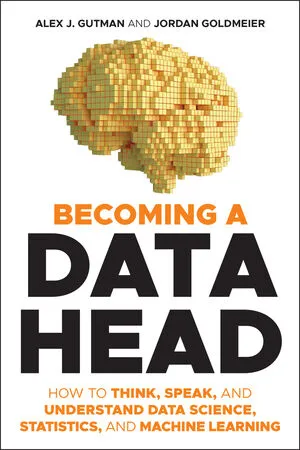📚 Finished reading Becoming a Data Head by Alex J Gutman and Jordan Goldmeier.
This book is a nice mix of layperson and a certain amount of technical content, all on the subject of using data. It’s primarily focused on the uses of data in the workplace.
It’s not going to teach you the intricacies of statistics - although it does introduce some useful concepts it’d be helpful to understand just to navigate one’s way through everyday life - nor how to construct cutting-edge AI models. But you probably will come away understanding more about how those things work and their limitations. As well as, probably more importantly for the target audience of this book - business people, executives, engineers or novice/wannabe data scientists - when and why you should consider using these kind of techniques, or, if you’re managing people or processes, when to permit someone use them on your behalf.
It’s thus frequently more about the mindset of data work than the technical details of it. When should you use data? What makes a project worth embarking on? When should you abandon it? And how should you react when folk present the results of their data projects to you?
The book is organised in to 4 sections, which give an idea of the trajectory readers will be following:
- Thinking like a Data Head
- Speaking like a Data Head
- Understanding the Data Scientist’s toolbox
- Ensuring success
The last one there is mostly referring to success of the data projects you or your colleagues may embark on.
So what then is a “Data Head”, that thing they want you to become?
…these are data skeptics, although the skepticism is based on employing their data critical-thinking skills rather than just to be annoying. They advocate for data where it’s useful, but question what ought to be questioned. Their skepticism comes from having technical knowledge and domain expertise. It’s delivered with empathy.
Their very reasonable claim is that using data for the sake of using data is not a great use of anyone’s resources, no matter what the hype says. Rather:
To be an effective Data Head you must use data to drive change.
And some things simply aren’t possible no matter how much you want them to be. Let’s never forget the famous phrase:
Garbage in, garbage out
This, according to the book, is especially the case with some of the fancier data techniques - if you are not a company with the unbelievable amounts of data, skilled personnel and other resources that say Google has, be more than a little cautious about believing that you can produce what they produce.
But almost certainly there are ways you and your organisation can productively use data. After all, the book proclaims that data may be the most important part of your job, whether or not you want it to be. You just need to distinguish productive avenues of inquiry from red herrings.
The book is impressively concise, and a pretty easy read if you have any familiarity with the topic. Along the way there are plenty of checklists and lists of good questions to ask at all phases of any data project, from conception to conclusion.
I can see these being useful for more knowledgeable data workers in addition to the target audience - the sort of people who already know their field well in terms of technical details, but also in some cases may risk getting carried away with their urge to spend time and money having fun with the latest and greatest algorithms on a project that never really stood a chance of working in the first place.
As an example, before starting on a data project the authors implore you to ask:
- Why is this problem important? If your answer focuses on the methodology or the deliverables involved them you’re probably missing the point of the question.
- Who does this problem affect? Can they actually use the results you’ll get? How will their job change?
- What if we don’t have the right data?
- When is the project over?
- What if we don’t like the results? Meaning that the project went well, but produced an answer the stakeholders didn’t want.
The last point is one I have often wished more folk consider than apparently do
Overall, the book helps you ask better questions, both of yourself and of others. There’s also a handy list of pitfalls later on in the book that are a good reference for checking your own work and (politely) challenging that of others.
